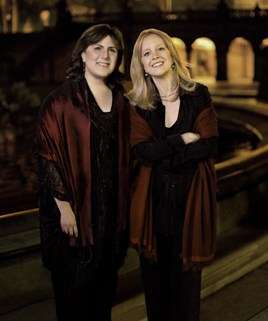|
Back
Upshaw sings Grieg, Rautavaara & Schneider Melbourne
Hamer Hall
02/23/2014 - & February 7 (Canberra), 9, 11, 12, 14, 15 (Sydney), 17 (Brisbane), 19 (Perth), 21 (Wollongong), 24 (Melbourne), 2014
John Adams: Selections from John’s Book of Alleged Dances
Einojuhani Rautavaara: Die Liebenden: "Liebes-Lied"
Edvard Grieg: Peer Gynt, Op. 23: "Solveig’s Song" – Holberg Suite, Op. 40
Maria Schneider: Winter Morning Walks
Edward Elgar: Introduction and Allegro, Op. 47
Dawn Upshaw (soprano)
The Australian Chamber Orchestra, Helena Rathbone (lead violin) 
D. Upshaw & M. Schneider (© Jimmy & Dena Katz)
One of the most recognisable signatures of the Australian Chamber Orchestra is the eclectic and diverse nature of its programs. This concert tour featuring renowned American soprano Dawn Upshaw is wide-ranging in its scope, reflecting the orchestra’s championship of contemporary composers equally with its prowess in the established repertoire. The American origins of the two contemporary works which commence each half are one musical link, and the references to the baroque in the works by Grieg and Elgar are another. Vocal works by Rautavaara and Grieg could not be more different but are linked by the Nordic origins of the composers; thus it becomes the concept of ‘origin’ which is the central idea behind this unusual selection.
Five pieces from John Adams’ Book of Alleged Dances formed an intriguing, humorous and energetic opening to the concert. The pieces may be performed in any sequence, and include pre-recorded electronic tracks in which Adams tells us the piano is transformed “into a kind of pygmy gamelan” by putting various objects into the strings. The overall impression from the five pieces is unmistakeably that of place. This is American music and, despite references to Latino and European heritages, there is no doubt for the listener that we are in the heartland of the USA. The challenge of playing live against the prepared backing was met dynamically by the ACO lead Helena Rathbone whose 1759 Guadagnini violin was given an outing unlike any other.
The first of the Nordic pieces was the love song "Liebes-Lied" by Finland’s Einojuhani Rautavaara. This song has a rolling momentum in which melody is hardly discernible. The solo voice is surrounded by billowing accompaniment which at time seems unrelated to the song-line yet captures the melancholy of the text. Ms Upshaw caught the spirit of the song eloquently, creating a far-off mournful tone, rising to brilliant highs and falling into deepest shadow in her lower register.
Her rendition of "Solveig’s Song" by Grieg was superb. We heard the anguish of the tormented Solveig awaiting the return of Peer Gynt and we felt the girl’s desperate hope as she placed her trust in nature and the passing of the seasons. The orchestra too captured the many emotional colours hidden in this piece. We heard Solvieg at her spinning wheel as well as her watching the summer slip slowly away as one year passed into another. It was a stirring performance from both orchestra and soloist which amply demonstrated the lusciousness of Ms Upshaw’s voice and brought enthusiastic acclaim from the audience.
The first half of the concert concluded with Grieg’s Holberg Suite. This popular piece demonstrates clearly the wonderful depth of sound and texture achieved by the twenty-odd players of the ACO.
Maria Schneider’s song cycle Winter Morning Walks was composed in 2011 for Dawn Upshaw; the piece earned Ms Schneider the 2012 Pulitzer Prize for music. The composer wanted to “wrap Dawn’s voice in the improvisations of jazz” and the cycle allows for a smooth blending of those references and the lovely softness of the early morning heard in the orchestral writing. Ms Upshaw brings out the deep emotions in both text and music. As with the Adams piece, there is no doubt that this is American writing; it references the landscape, the culture, even the light of the cold crisp mornings. In the program, Schnieder speaks of her Minnesota roots and we hear this frequently throughout the song cycle. The performances in this concert tour are Australian premieres and the reception for the music and for its delivery by Dawn Upshaw and the ACO was instant and warm. Together, they captured the rawness of the personal emotions as well as the dazzlingly clear insight achieved by poet Ted Kooser into life, nature and relationships when walking to overcome his treatment for cancer. One moment of brilliance came in "Walking By Flashlight" when we experience the pre-dawn darkness, broken by a swaying pool of light from the flashlight and poet, composer and performers harmonise perfectly to deliver “...this man with the moon on a leash...” It is hard to imagine that anyone in the audience could have failed to be moved by Ms Upshaw’s realisation of that moment when “...the sun stood / at the end of the road / and waited for me...” from the final song "How Important It Must Be". This is a beautiful song cycle in every sense: its easily accessible musicality; its frail minuscule observations of the human condition and the sheer beauty of Dawn Upshaw’s voice supported by the ACO.
Elgar’s hugely popular Introduction and Allegro from 1905 concluded the program. While not immediately obvious as a companion to the rest of the program, this was an entirely satisfying finale. The work draws from Elgar’s knowledge of the 18th century; in its elaboration of themes and ideas it provides an opportunity for the virtuosic playing of the ACO. There was great appreciation for this performance which gave the whole program a rounded and pleasing denouement.
Gregory Pritchard
|